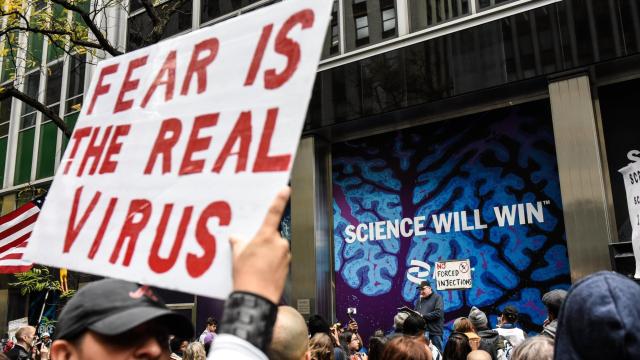Which federal appeals court will rule on the numerous lawsuits brought by conservative groups against Joe Biden’s plans to roll out an employer vaccine mandate will come down to what amounts to a raffle.
The White House, via the Occupational Safety and Health Administration, will begin requiring most federal contractors and large employers (over 100 staff members) to have all employees either certify they are vaccinated against covid-19 or pass weekly tests starting on Jan. 4th. The order also applies to most federal employees and health care workers. While legal experts have generally indicated that the Biden administration has the authority to push such a directive in response to a “grave danger,” dozens of Republican states, business and industry associations, and other entities such as religious organisations have filed federal lawsuits aiming to stop it. As NPR reported on Monday, in situations in which multiple plaintiffs are separately suing on a matter involving “one or more common questions of fact,” only one merged suit can actually continue to a federal appeals court.
To accomplish this, a consolidation process is carried out. Each U.S. Circuit court that is hearing at least one of the lawsuits (in this case, nearly all of them) gets the equivalent of a raffle card. The clerk of the Judicial Panel on Multidistrict Litigation will then place those cards in a literal drum, mix them around, and select one at random, at which point the winning Circuit court will become the venue for the combined lawsuit. Until 1988, Bloomberg Law reported, the process instead relied on which parties could get their cases stamped for review first.
Where the consolidated case lands could have huge ramifications, both on the lawsuit itself and on the political fortunes of the Biden administration, which has touted the employer mandate as its signature response to the coronavirus pandemic after a predecessor who took little effective action. It would also obviously have a major impact on the pandemic, as OSHA has estimated the rule will prevent 6,500 deaths and 250,000 hospitalizations among workers aged 18 to 64 in the first six months alone. Random chance could hand the case over to a jurisdiction friendly to the plaintiffs, such as the conservative Fifth Circuit Court of Appeals in New Orleans, which already ruled twice in November to temporarily prevent the rule from going into effect pending judicial review. In the second of those rulings, the Fifth Circuit judges called the mandate “staggeringly overbroad.”
According to Bloomberg Law, other state petitions filed so far have landed in the Sixth, Eighth, and Eleventh U.S. Circuit Courts of Appeal, which have majorities of GOP-appointed judges (in the Eighth, only one judge was appointed by a Democrat). If the case lands in a sufficiently conservative jurisdiction, and the three-judge panel randomly selected to overhear it ends up being composed of justices hostile to the administration, the mandate could risk being dead on arrival. On the other hand, the Circuit court it lands with could vote to vacate the Fifth Circuit’s rulings that stayed the rule.
Greenberg Traurig labour and employment attorney Johnine Barnes told NPR, “It really is a true lottery. There is no court that is given preferential treatment over another.”
While judges are officially non-partisan, this obviously isn’t the case in practice. At least one study has shown staggering spikes in partisan power moves in the past few years, such as when judges appointed by a president from one party gang up to overrule decisions issued by their colleagues appointed from the other side of the aisle. Donald Trump’s administration was also particularly effective at flooding the federal judiciary with arch-conservative appointees, appointing the most Article III federal judges during his first term in office than any other president but Jimmy Carter. In particular, Trump appointed around 30% of the 179 total slots in federal appeals courts. If the case goes to the Supreme Court, which is seen as likely, conservatives will enjoy an absurdly lopsided 6-3 ideological split in their favour.
This situation isn’t as dire for the mandate as much as it might seem at face value, even if the case lands in an unfriendly jurisdiction, Wake Forest University professor of administrative law Sidney Shapiro told Bloomberg Law. That’s because of the random selection of the three-judge panels, and differences in judicial philosophy among justices appointed by the same party, he said.
“Even though they’re marginal advantages, you don’t want to pass that up because the stakes are very high,” Shapiro told the site.
Parties can also petition circuit courts to change the venue to somewhere else, Hogan Lovells attorney Sean Marotta told Bloomberg Law, based on factors such as the location of the plaintiffs/defendants and their lawyers.
According to NPR, the Biden administration has urged employers to act as though the Circuit court where the case lands will lift the stay, allowing the first phase of the order (a mask mandate for unvaccinated employees) to go into effect on Dec. 6. The random lottery is scheduled to take place this week on or around Nov. 16.
